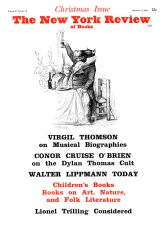In response to:
Literary Industry from the October 28, 1965 issue
To the Editors:
As an admirer of Walpole-Lewis (as one would say Bach-Busoni) I was interested to see what Brendan Gill would have to say about them, and was a little chagrined to find his defense as irrelevant and frivolous as J. H. Plumb’s attack. (Surely Mr. Plumb’s failure to use Mr. Besterman’s Christian name, or names, should have been beneath Mr. Gill’s notice.) Mr. Plumb’s fault, indeed, is the more serious: first, because he is an historian, and cannot allow himself the fribbles of the amateur. The old saw about admiring the unread volumes on a shelf is particularly inappropriate: the reader who is content to admire the staid exterior of the books when he could be enjoying their immensely agreeable inside has no business to blame Wilmarth Lewis or the nouvelle vague in research for his own foolishness; second, because he appears to have waved aside Walpole’s historical importance on no more serious ground than contempt for his private character. But it is precisely on the point of Walpole’s place in the social and political history of the 18th century that the Yale Correspondence must justify itself, and it should not be necessary to remind an historian of Mr. Plumb’s eminence that the character a man brings to the notice of his contemporaries can be surprisingly at variance with the notice that history crowns him with.
Mr. Gill, like Mr. Plumb, puts aside what ought to have been the central figure in the discussion in favor of a defense of Mr. Besterman that is more jejune than Mr. Plumb’s attack. I recognize that in this instance Mr. Gill is in mufti, so to speak, and can allow himself some capers. And it may be that Mr. Besterman needs to be defended; Mr. Lewis and his associates do not. But it is curious that his letter should exhale the same air of loftiness, supercilious resentment, and inattention to the matter at hand that breathes from Mr. Plumb’s review…
Vera Liebert
Bard College
Annandale-on-Hudson
New York
J.H Plumb replies:
As I forecast the criticism in my review (NYR, 9.30.65) would be remembered, the praise forgotten. I would, however, like to stress again two points in answer to Brendan Gill (Oct. 28.) and Miss Liebert.
I have no quarrel with the editions of Voltaire or Rousseau, such dominant figures deserve great editions; but even they do not deserve to have every scrap of writing immortalized: editorial work means judgment as well as publication and annotation. What I fear is the proliferation of vast editorial projects in Europe, following the American example.
As for Miss Liebert: her view of what is important for social and political history of eighteenth-century England would obviously differ completely from mine. Social history for me is not chatter, or gossip about dilettante activities; the major problems of late eighteenth-century society—industrialism, radicalism, the decay of local government, rise of rural poverty, etc., etc., Walpole never touched upon. He is useful to the historian for decoration not understanding. The cult of Walpole obscures rather than reveals both the nature of English politics and of English society of his time. That seems to me irrefutable, but I doubt whether I could ever convince Miss Liebert, who obviously prefers entertaining chitchat to historical analysis.
This Issue
December 9, 1965



